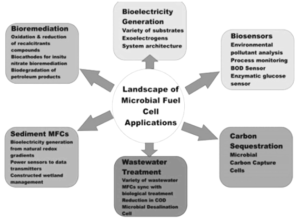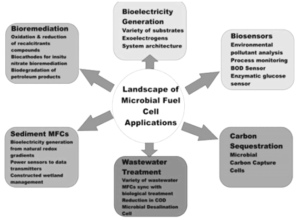What are Microbial Fuel Cells? Discuss its possible applications in various fields. (150 words)
Approach
- Briefly explain what is Microbial Fuel Cell (MFC)
- Mention its potential as a clean fuel over other conventional fuel
- Conclude suitably
Introduction
A microbial fuel cell (MFC) is a device that converts chemical energy to electrical energy by the action of microorganisms. It is a bio-electrochemical system that uses bacteria as the catalyst to oxidize organic and inorganic matter, and consequently, generate electric current out of it. It has applications in various fields such as power generation systems, bio-recovery, waste-water treatment, etc.
Body
MFCs are attractive for power generation applications that require only low power, where replacing batteries may be impractical such as wireless sensor networks. Wireless sensors, powered by microbial fuel cells can then, for example, be used for remote monitoring.
It is the only technology that can generate energy out of waste, without the input of external/additional energy, and this renders MFCs suitable for remote area access via the robotics route or remote power generation.
MFC can be used as a convenient biosensor for wastewater streams. Wastewater is evaluated based on the amount of dissolved oxygen required by aerobic bacteria to break down the organic contaminants present in a body of water. The richer the wastewater stream is, the greater the current an MFC can provide.
The use of MFC is not only enclosed to electricity production and wastewater treatment it has also been expanded to produce clean energy fuel like hydrogen and desalination process.
Moreover, this emerging technology is significantly devoted to alleviating the environmental stress associated with the emission of greenhouse gases into the environment. It can act as an alternative to reduce the burden of an increased energy crisis and meet societal needs.
Conclusion
MFCs is still a nascent technology but through continuous research and development in such technologies, we may find solutions to our global environmental problems. Hence, MFCs can play a role in the future for the next generations.






